For 1990-2009 cars only
Removal Procedure
- Disconnect the negative battery cable. Refer to Battery Negative Cable Disconnection and Connection.
- Remove the fuel injector sight shield. Refer to Fuel Injector Sight Shield Replacement.
- Release the clamp from the brake booster vacuum hose connection.
- Disconnect the brake booster vacuum hose from the intake manifold.
- Remove the air cleaner assembly. Refer to Air Cleaner Assembly Replacement.
- Discharge the fuel system. Refer to Fuel Pressure Relief.
- Disconnect the evaporative emission (EVAP) hose/pipe from the EVAP canister purge solenoid valve. Refer to Plastic Collar Quick Connect Fitting Service.
- Disconnect the engine fuel hose/pipe from the chassis fuel hose/pipe. Refer to Metal Collar Quick Connect Fitting Service.
- Discharge the air conditioning (A/C) system. Refer to Refrigerant Recovery and Recharging.
- Remove the A/C compressor suction hose assembly from the compressor. Cap or plug the hoses and compressor to prevent contamination. Refer to Suction Hose Replacement.
- Remove the A/C compressor discharge hose assembly from the compressor. Cap or plug the hoses and compressor to prevent contamination. Refer to Discharge Hose Replacement.
- Drain the engine coolant from the cooling system. Refer to Cooling System Draining and Filling.
- Tie the radiator, A/C condenser and fan module assembly to the upper radiator support to keep the assembly with the vehicle when the frame and drivetrain is removed.
- Remove the coolant recovery reservoir. Refer to Coolant Recovery Reservoir Replacement.
- Disconnect the inlet coolant heater hose from the engine. Refer to Heater Inlet Hose Replacement.
- Disconnect the outlet coolant heater hose from the engine. Refer to Heater Outlet Hose Replacement.
- Remove the radiator inlet hose. Refer to Radiator Inlet Hose Replacement.
- Raise and support the vehicle. Refer to Lifting and Jacking the Vehicle.
- Remove the exhaust flexible pipe and secure the rear half of the exhaust system to the vehicle underbody. Refer to Exhaust Flexible Pipe Replacement.
- Remove the front tires. Refer to Tire and Wheel Removal and Installation.
- Remove the engine splash shield. Refer to Engine Splash Shield Replacement.
- Remove the steering intermediate shaft pinch bolt and discard the bolt.
- Disconnect the steering intermediate shaft from the steering gear.
- Remove the right and left steering linkage outer tie rod ends from the steering knuckles. Refer to Steering Linkage Outer Tie Rod Replacement.
- Remove the right and left stabilizer shaft links from the stabilizer shaft. Refer to Stabilizer Shaft Link Replacement.
- Remove the right and left lower ball joints from the steering knuckles. Refer to Lower Control Arm Replacement.
- On front wheel drive (FWD) models, place a drain pan under the transaxle then separate the right and left front wheel drive shafts from the transaxle. Refer to Front Wheel Drive Shaft Replacement.
- On all wheel drive (AWD) models, remove the driveline torque tube. Refer to Driveline Torque Tube Replacement.
- On all models, place a block of wood (1) between the frame and the engine oil pan in order to support the engine once the bolts are removed from the right engine mount.
- Place a block of wood (1) between the frame and the transaxle in order to support the transaxle once the bolts are removed from the left transaxle mount bracket.
- Lower the vehicle.
- Remove the engine mount strut. Refer to Engine Mount Strut Replacement - Right Side.
- Disconnect and reposition the engine harness as necessary.
- Raise the vehicle.
- Disconnect the power steering hoses at the power steering fluid cooler. Refer to Power Steering Cooler Pipe/Hose Replacement.
- Place a universal frame support fixture or jackstands under the frame.
- Lower the vehicle until the frame contacts the frame support fixture or jackstands.
- Remove the frame-to-body and frame reinforcement bolts. Discard the bolts.
- Carefully raise the vehicle body up away from the powertrain.
- Disconnect all necessary engine electrical wiring harness connectors.
- Remove the throttle body assembly. Refer to Throttle Body Assembly Replacement.
- Remove the starter motor. Refer to Starter Replacement.
- Remove the torque converter bolts (1).
- Install the engine lift hooks.
- Install an engine lift chain to the engine lift hooks.
- Remove the engine and transmission mount nuts from the frame.
- Support the engine weight with an engine hoist and raise the engine and transmission assembly off the frame.
- Lower the engine/transmission assembly to a suitable work area.
- Remove the automatic transaxle bolts.
- Separate the automatic transaxle from the engine.
- Lift the engine away from the automatic transaxle.
- Secure the engine to an engine stand.
- Remove any additional engine components as necessary. Refer to appropriate component sections in manual if needed.
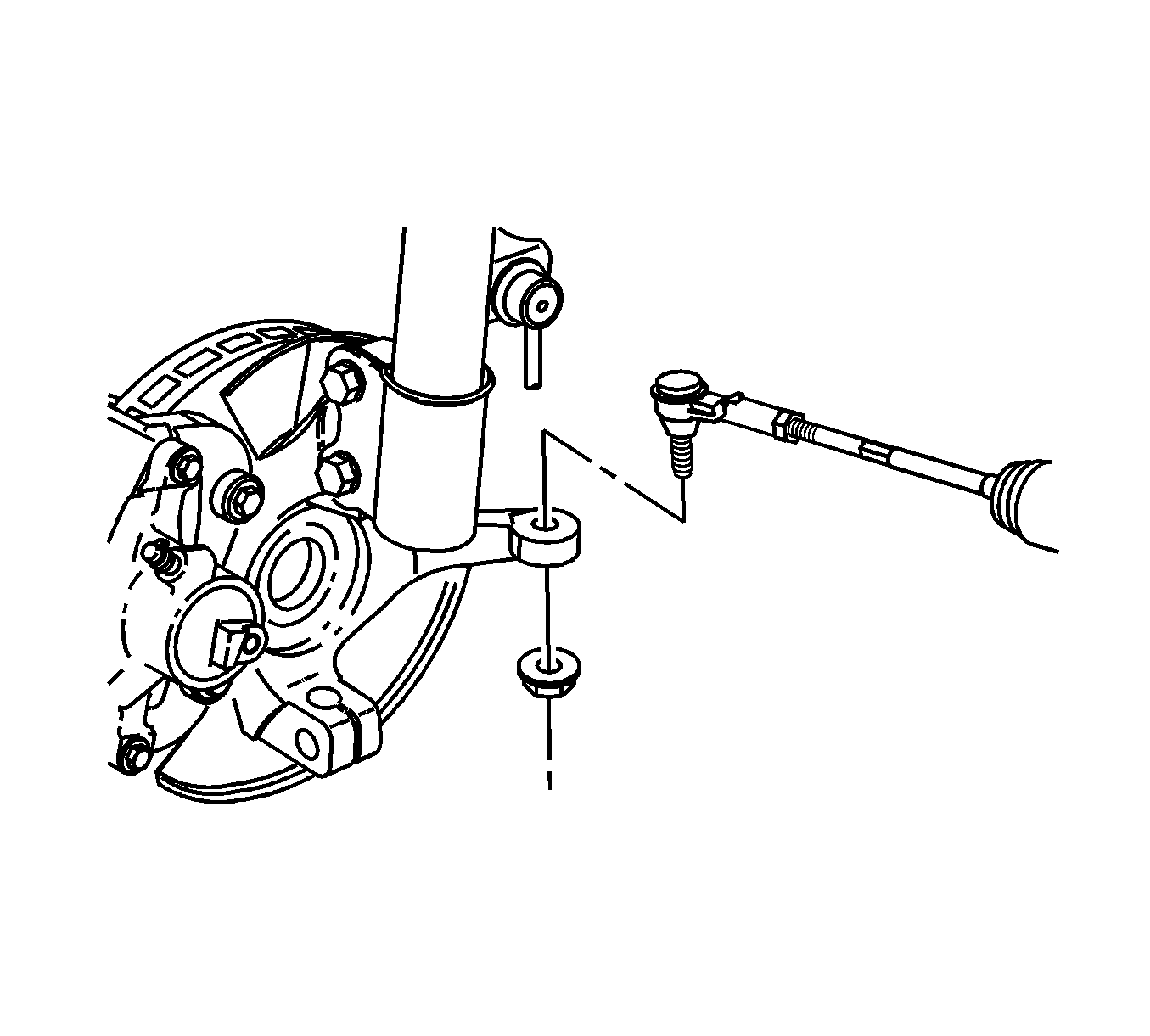
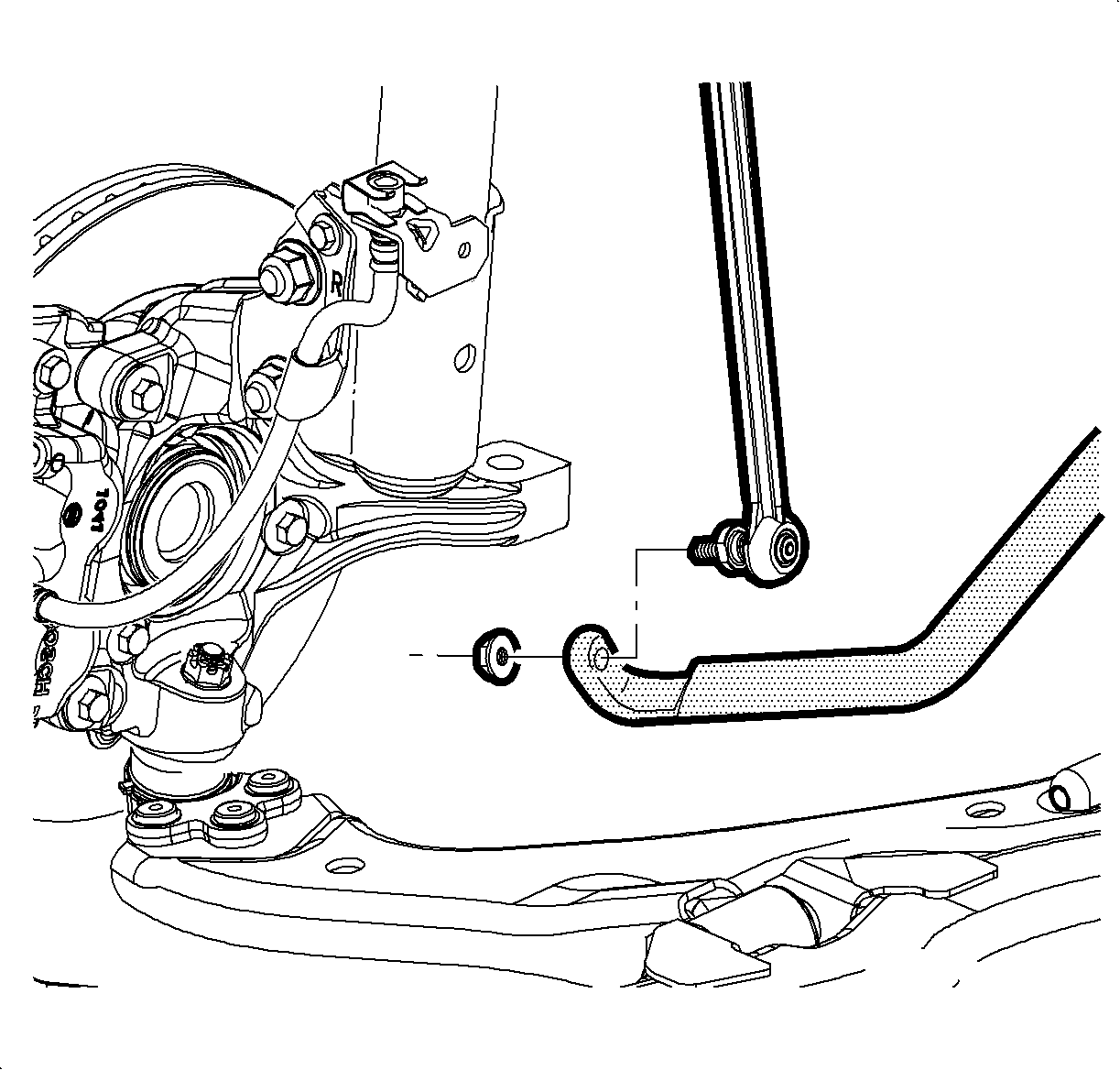
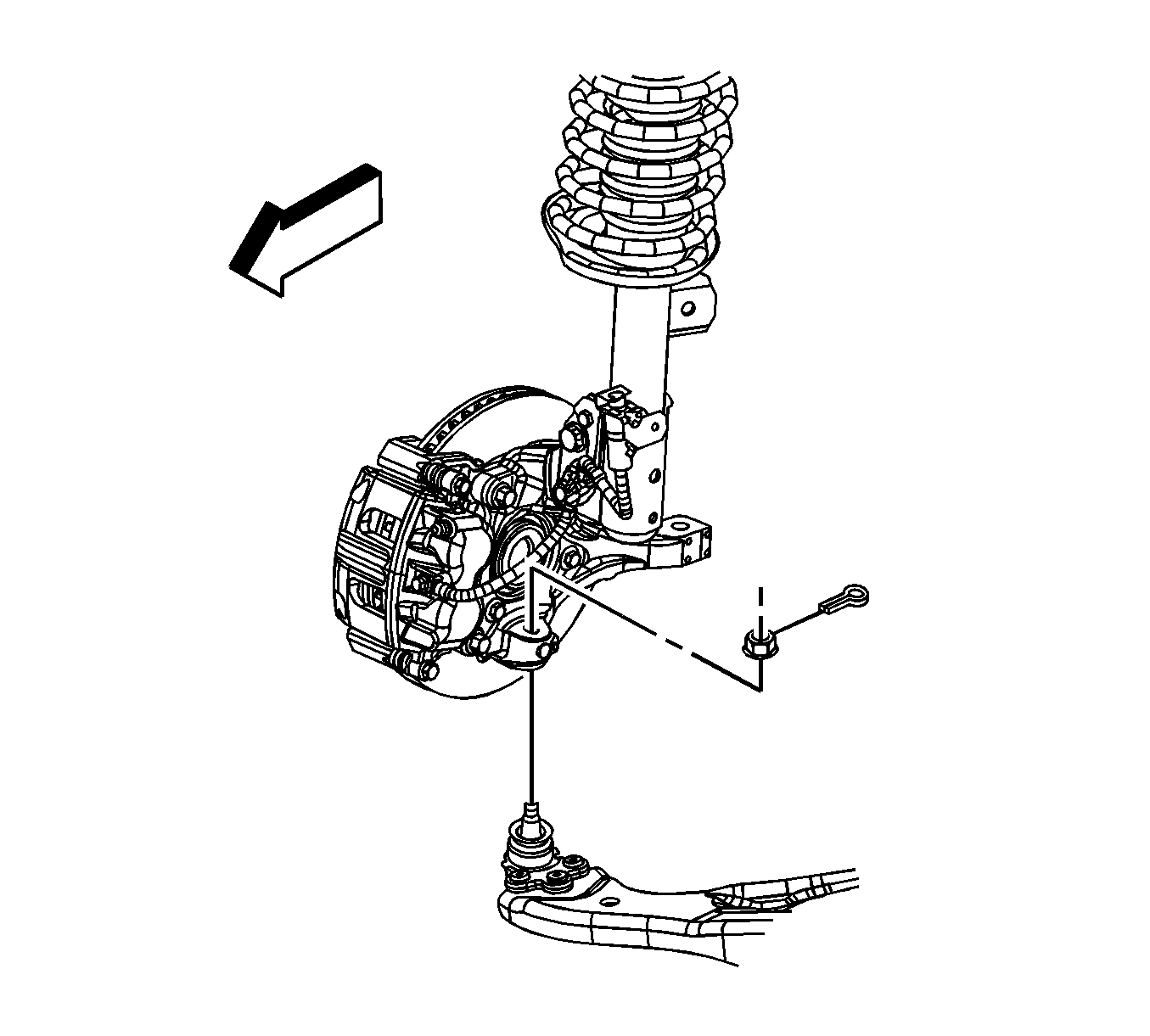
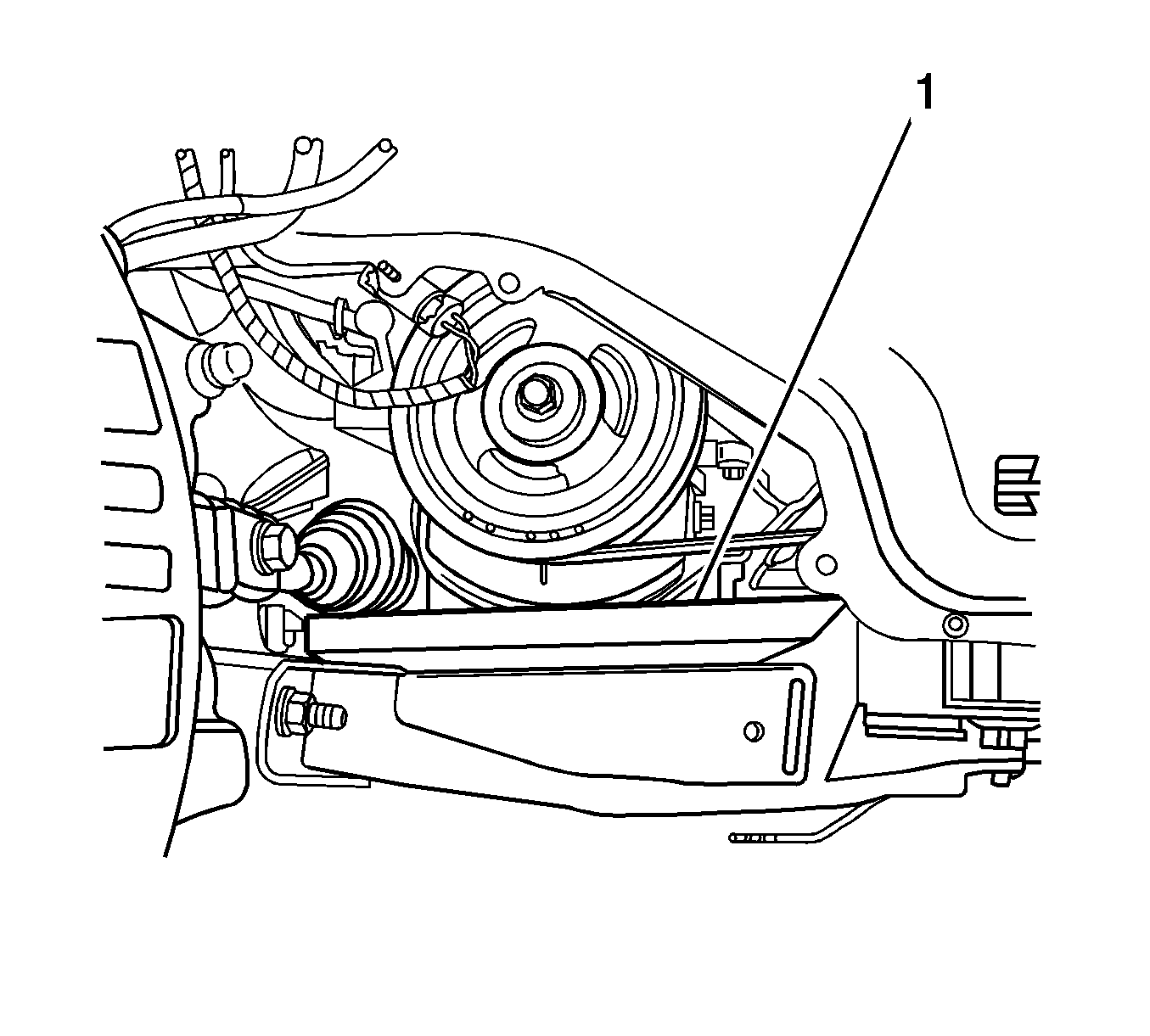
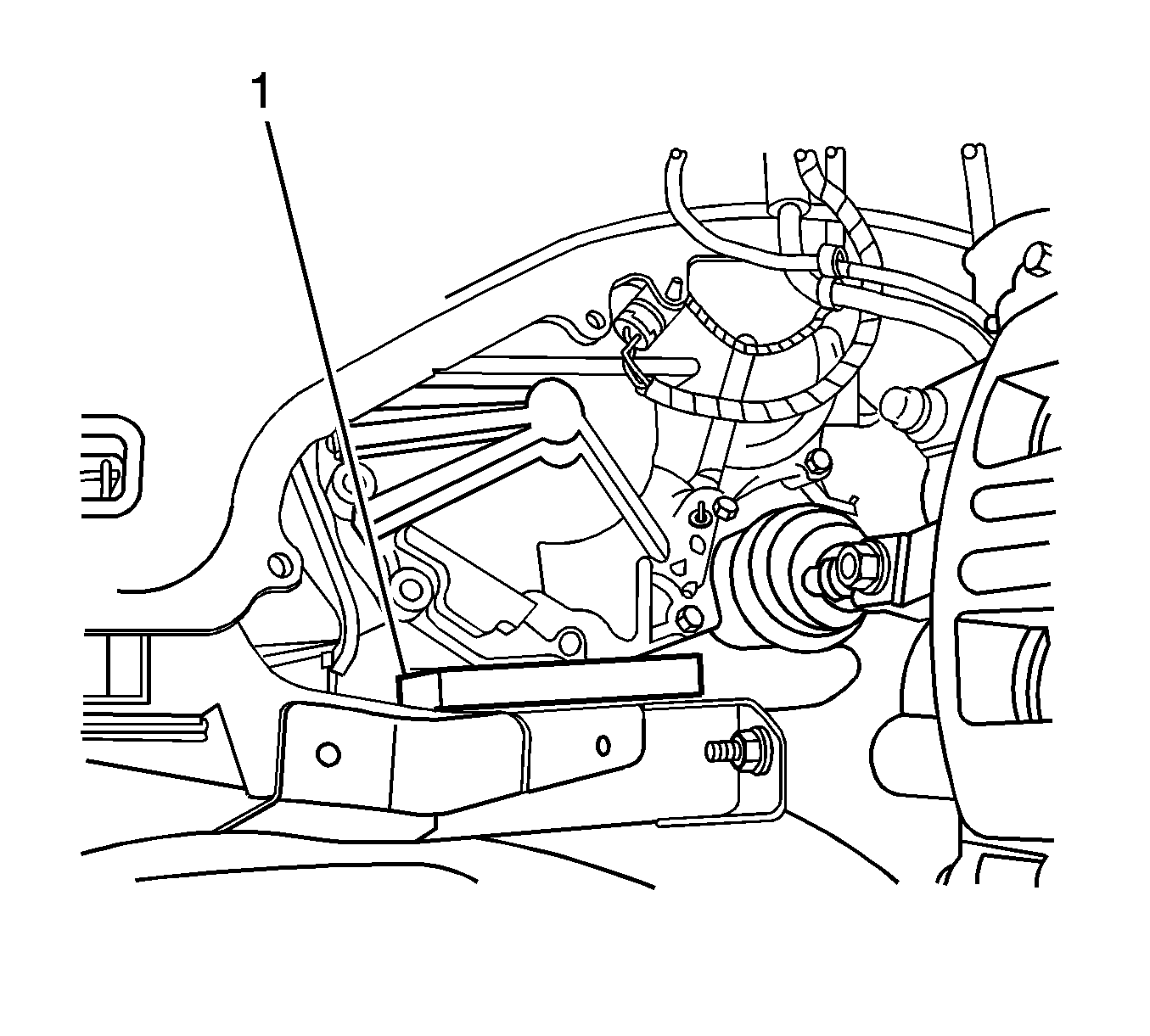
Note: Ensure the vehicle body is secured to the hoist.
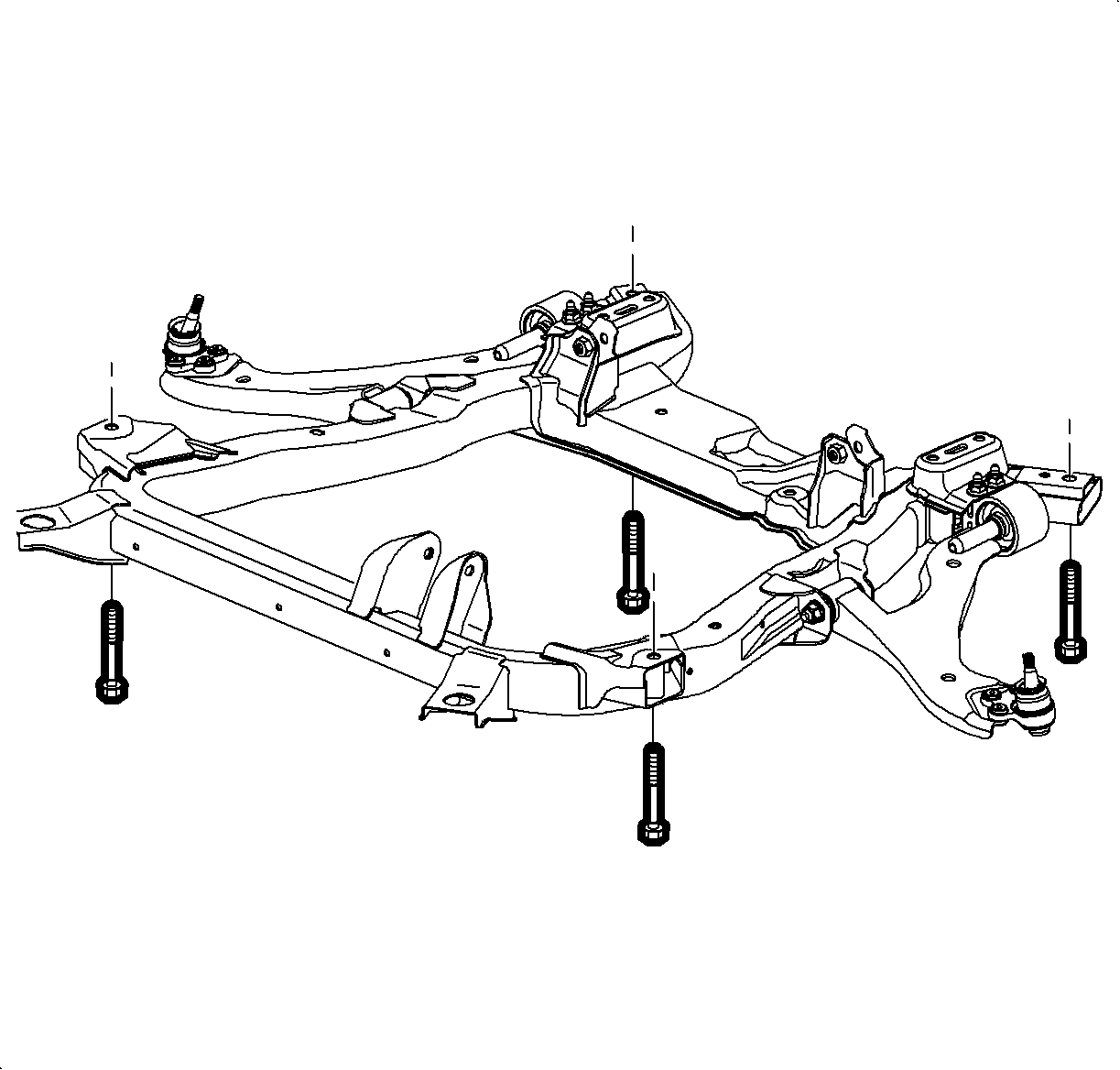
Note: Inspect for areas of body to powertrain contact or entanglement of wires and hoses while separating the vehicle body and powertrain.
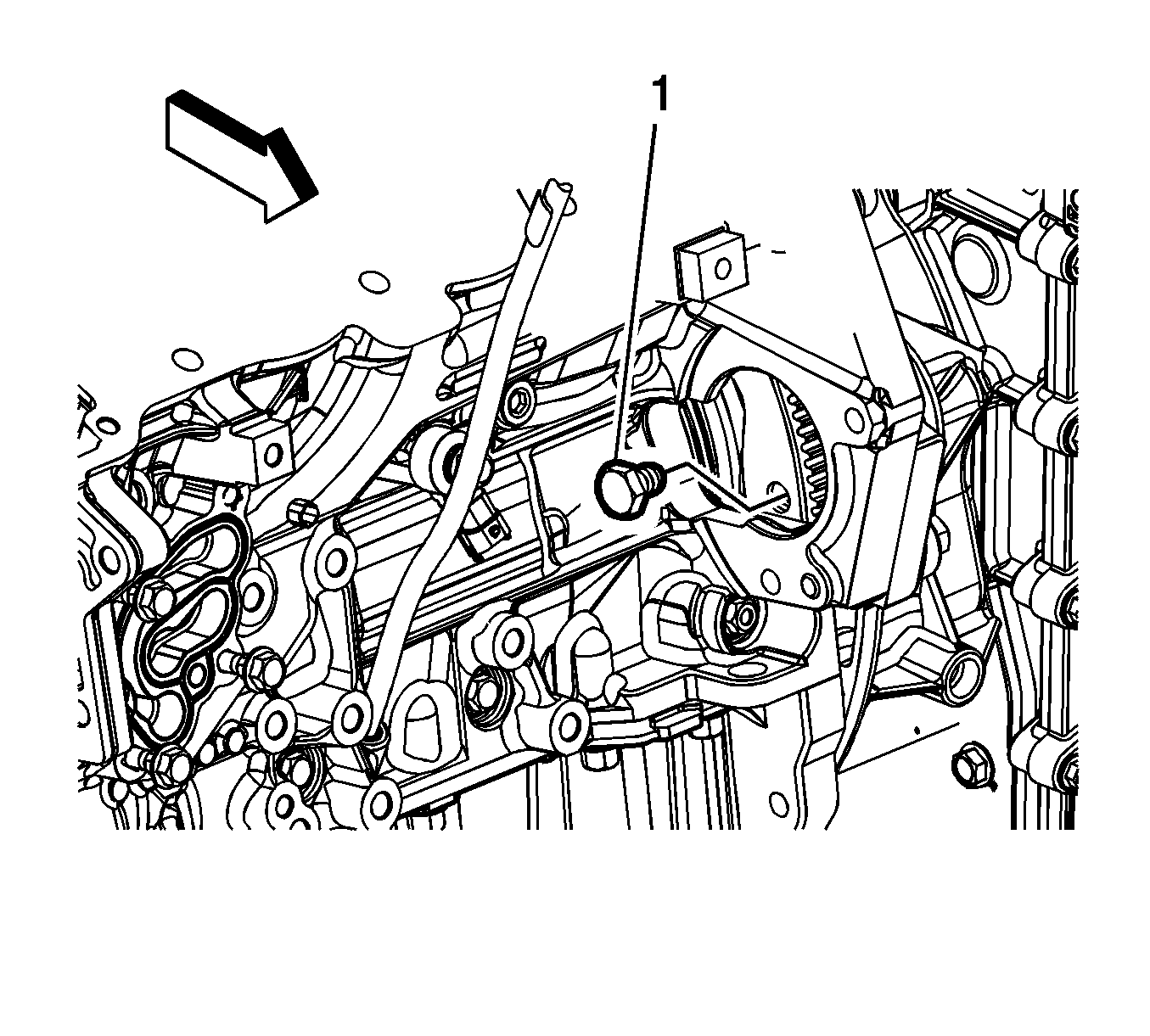
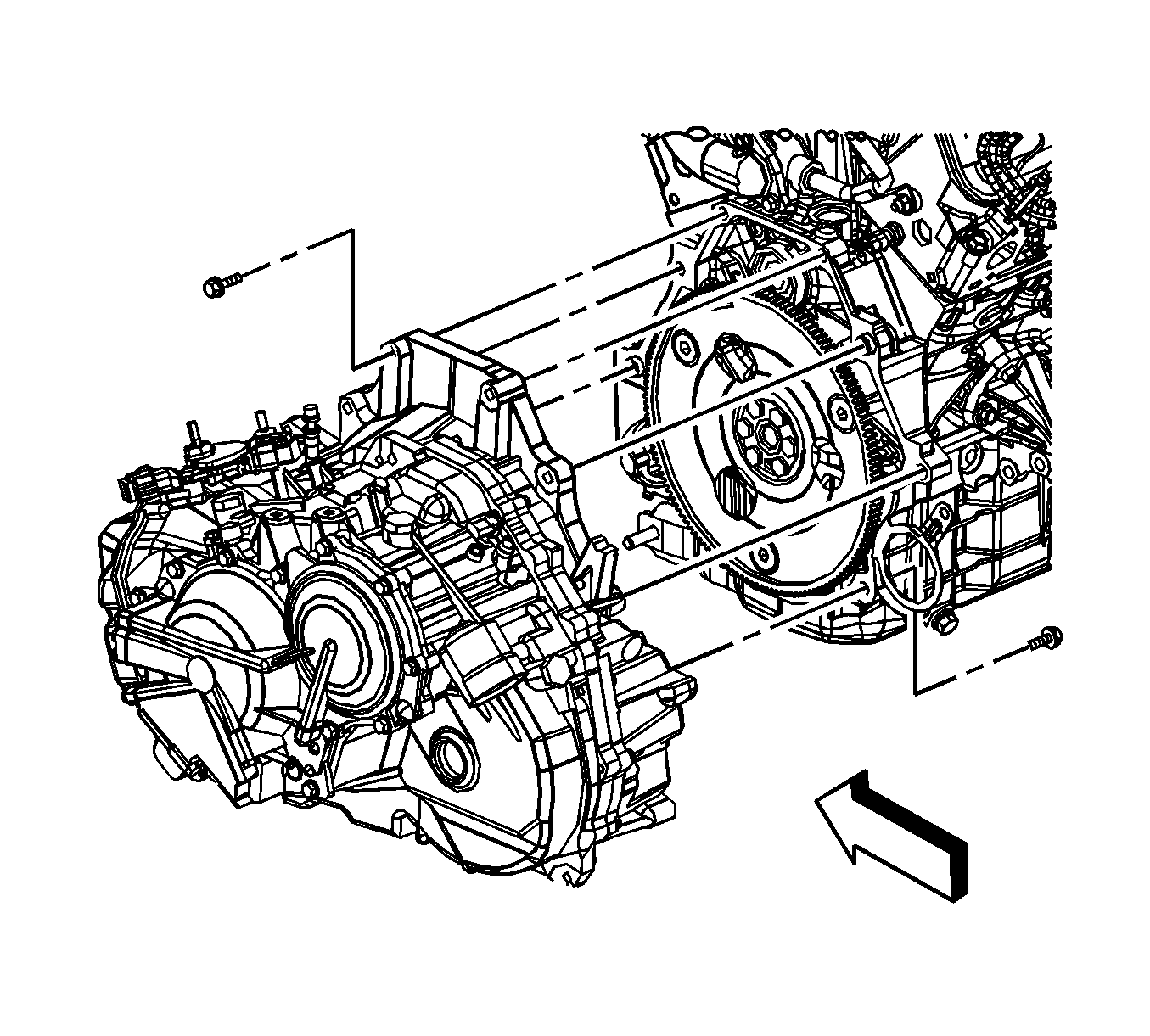
Installation Procedure
- Remove the engine from the engine stand.
- Align the engine to the frame and automatic transaxle.
- Install the automatic transaxle bolts and tighten to 75 N·m (55 lb ft).
- Place a block of wood between the frame and the engine oil pan in order to support the engine on the frame once the engine hoist is removed.
- Remove the engine hoist and lift chain.
- Install the torque converter bolts and tighten to 60 N·m (44 lb ft).
- Install the starter motor. Refer to Starter Replacement.
- Install the throttle body assembly. Refer to Throttle Body Assembly Replacement.
- Connect all necessary engine electrical wiring harness connectors.
- Install NEW frame-to-body bolts and tighten to 155 N·m (114 lb ft).
- Raise the vehicle up away from the frame support fixture or jackstands and remove the support fixture or jackstands from under the vehicle.
- Connect the power steering hoses to the power steering fluid cooler. Refer to Power Steering Cooler Pipe/Hose Replacement.
- Lower the vehicle.
- Install the left transaxle mount bracket. Refer to Transmission Mount Bracket Replacement - Left Side.
- Install the engine mount strut. Refer to Engine Mount Strut Replacement - Right Side.
- Raise the vehicle.
- Remove the block of wood (1) between the frame and the transaxle used to support the transaxle while the bolts were removed from the left transaxle mount bracket.
- Remove the block of wood (1) between the frame and the engine oil pan used to support the engine while the bolts were removed from the right engine mount.
- On AWD models, install the driveline torque tube. Refer to Driveline Torque Tube Replacement.
- On FWD models, install the right and left front wheel drive shafts into the transaxle. Refer to Front Wheel Drive Shaft Replacement.
- On all models, install the right and left lower ball joints to the steering knuckles. Refer to Lower Control Arm Replacement.
- Install the right and left stabilizer shaft links to the stabilizer shaft. Refer to Stabilizer Shaft Link Replacement.
- Install the right and left steering linkage outer tie rod ends to the steering knuckles. Refer to Steering Linkage Outer Tie Rod Replacement.
- Connect the steering intermediate shaft to the steering gear.
- Install a NEW pinch bolt to the steering intermediate shaft and tighten to 34 N·m (25 lb ft).
- Install the engine splash shield. Refer to Engine Splash Shield Replacement.
- Install the front tires. Refer to Tire and Wheel Removal and Installation.
- Install the exhaust flexible pipe. Refer to Exhaust Flexible Pipe Replacement.
- Install the radiator outlet hose. Refer to Radiator Outlet Hose Replacement.
- Lower the vehicle.
- Install the radiator inlet hose. Refer to Radiator Inlet Hose Replacement.
- Connect the outlet coolant heater hose to the engine. Refer to Heater Outlet Hose Replacement.
- Connect the inlet coolant heater hose to the engine. Refer to Heater Inlet Hose Replacement.
- Install the coolant recovery reservoir. Refer to Coolant Recovery Reservoir Replacement.
- Untie the radiator, AC condenser, and fan module assembly from the upper radiator support.
- Install the A/C compressor discharge hose assembly to the compressor. Refer to Discharge Hose Replacement.
- Install the A/C compressor suction hose assembly to the compressor. Refer to Suction Hose Replacement.
- Connect the engine fuel hose/pipe (3) to the chassis fuel hose/pipe (2). Refer to Metal Collar Quick Connect Fitting Service.
- Connect the EVAP hose/pipe to the EVAP canister purge solenoid valve. Refer to Plastic Collar Quick Connect Fitting Service.
- Install the air cleaner assembly. Refer to Air Cleaner Assembly Replacement.
- Connect the brake booster vacuum hose (2) to the intake manifold.
- Position the clamp (1) on the brake booster vacuum hose connection.
- Install the fuel injector sight shield. Refer to Fuel Injector Sight Shield Replacement.
- Fill the engine with engine oil. Refer to Approximate Fluid Capacities , Fluid and Lubricant Recommendations , and Maintenance Schedule.
- Fill the engine with coolant. Refer to Cooling System Draining and Filling.
- Check the transaxle fluid level. Refer to Adhesives, Fluids, Lubricants, and Sealers , Transmission General Specifications , and Approximate Fluid Capacities.
- Charge the AC system. Refer to Refrigerant Recovery and Recharging.
- Add power steering fluid and bleed air from the power steering system. Refer to Power Steering System Bleeding.
- Prime the fuel system.

Caution: Refer to Fastener Caution in the Preface section.







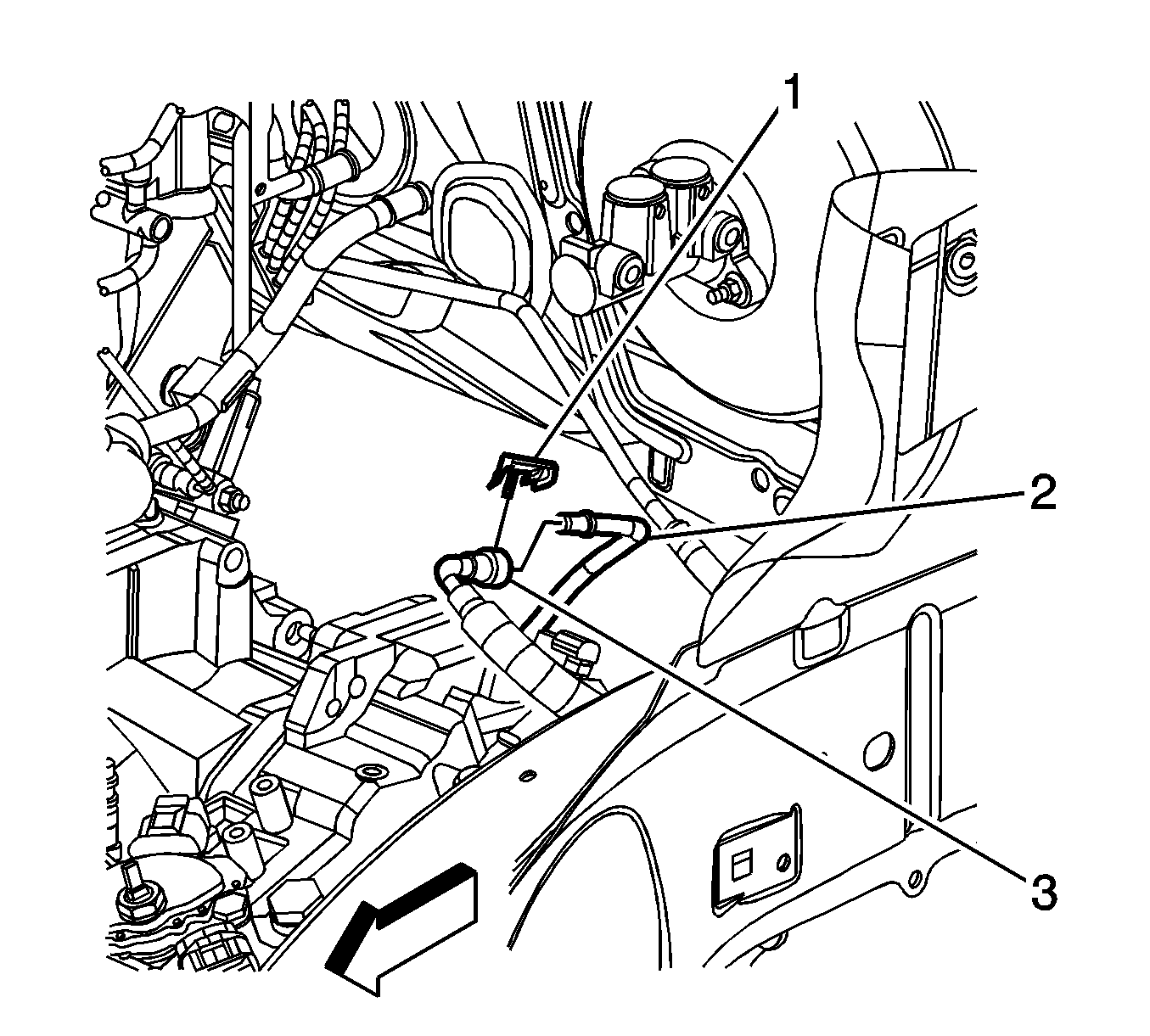
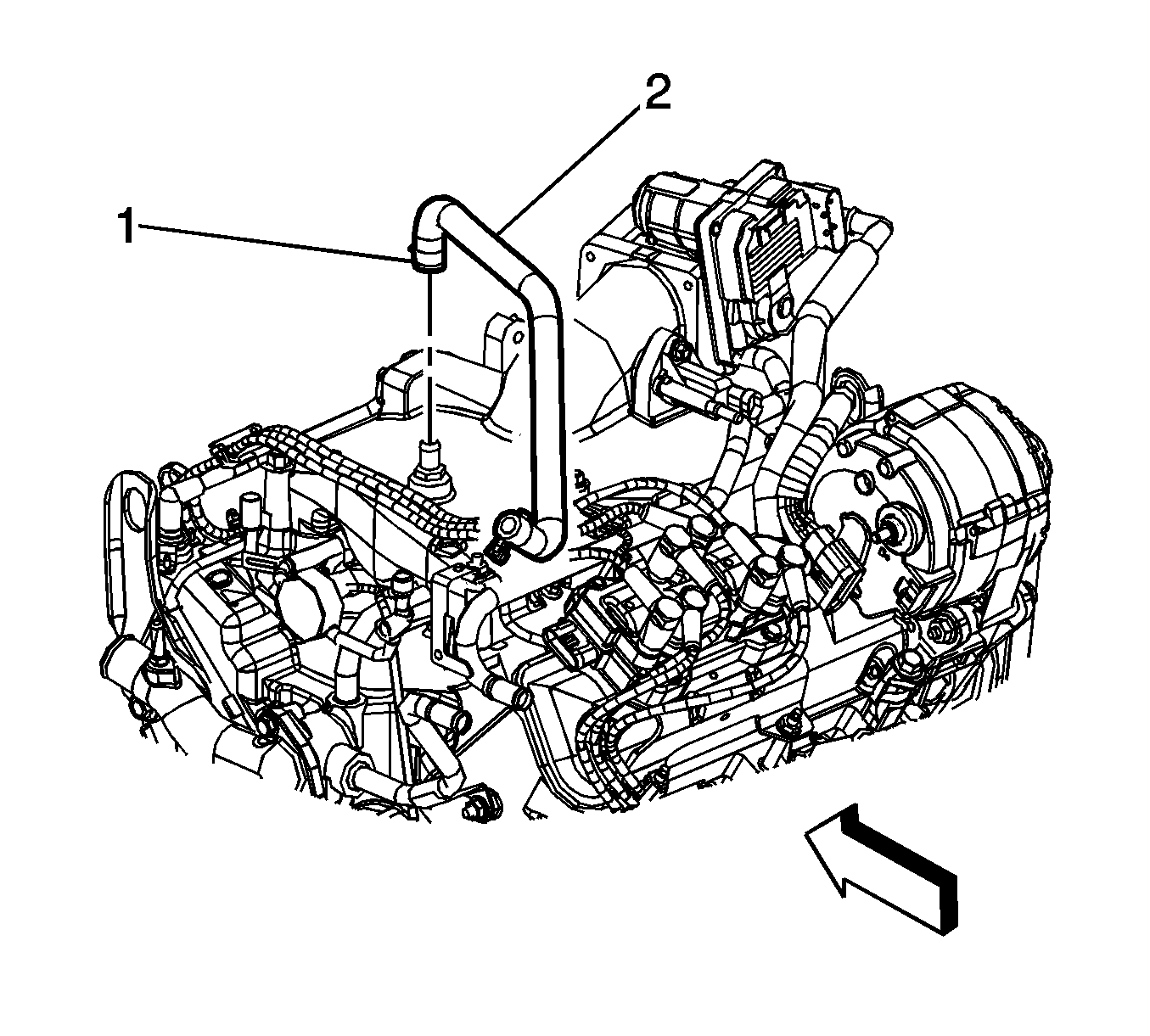
| 49.1. | Cycle the ignition ON for 5 seconds then OFF for 10 seconds. Repeat cycling twice. |
| 49.2. | Crank the engine until it starts. The maximum starter motor cranking time is 20 seconds. |
| 49.3. | If the engine does not start, repeat the steps. |
